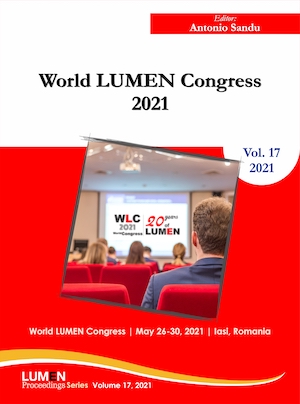Value Orientations in Education System: Approach, Interpretation, and Formation
Value Orientations in Education System: Approach, Interpretation, and Formation
Author(s): Diana Antoci
Subject(s): Social Sciences, Education, School education, Pedagogy
Published by: Editura Lumen, Asociatia Lumen
Keywords: value;value orientations;adolescents;young people;Pedagogical model;behaviours;affective states;attitudes;convictions;values;
Summary/Abstract: The implemented theoretical study has revealed various scientific positions aimed at: interpreting the concepts of value and value orientation; finding controversial positions and affinities in the use of “value” and “value orientation” concepts; identifying ambiguous positions on structural elements of value orientation and value formation mechanism.The purpose of undertaken research was theoretical, experimental and methodological in nature, outlining formation of value orientations in adolescence and youth ages.The developed definitions and determined structural components of value orientations allowed initiation of an experimental investigation of value orientations in adolescents and young people through which interrelation between the constitutive components of value orientation was confirmed, the specifics of values in adolescents and young people was emphasized. Outlining the specifics of value orientation structure led to identification of criteria, indicators and descriptors and to development and validation of a Questionnaire for Value Orientation Assessment.The results of experimental study laid the basis for development and recognition of a Pedagogical Model for formation of value orientations in adolescents and young people. The previously identified mechanism for formation of values and functioning of value orientations was transposed into the nucleus of the Pedagogical Model, which included the following components: behaviour, emotional states, attitudes, convictions, and values.In order to identify the methodology for forming value orientations in the formal, informal and non-formal educational environment, the principles of humanistic, constructivist and cognitivist education, strategies, conditions were highlighted, which ensure a dynamic progress in general development of the personality, implicitly of value orientations, and which is taken into account in framework of a formative experiment.The data obtained from the validation of the developed Pedagogical Model confirmed its effectiveness and proved that it was a multidimensional one, which could be of great benefit to specialists in the field of Education Sciences and teachers from schools and higher educational institutions.
Book: World Lumen Congress 2021
- Page Range: 06-25
- Page Count: 21
- Publication Year: 2022
- Language: English
- Content File-PDF

